Literature Review | High-Dose Synthetic Folic Acid May Pose Heart Risks to Early Embryos; 6S-5-Methyltetrahydrofolate-Calcium Proves Safer
Supplementing with folate during pregnancy is a crucial step for every expectant mother, as it plays a vital role in preventing neural tube defects in the fetus. However, in recent years, the potential impact of folate supplementation on other aspects of health, particularly the cardiovascular system, has garnered increasing attention from the scientific community.
In this article, we delve into a study published in the journal Cells, which investigates the cardiovascular toxicity of folic acid (FA) and Magnafolate (MTHF-Ca) during early embryonic development.
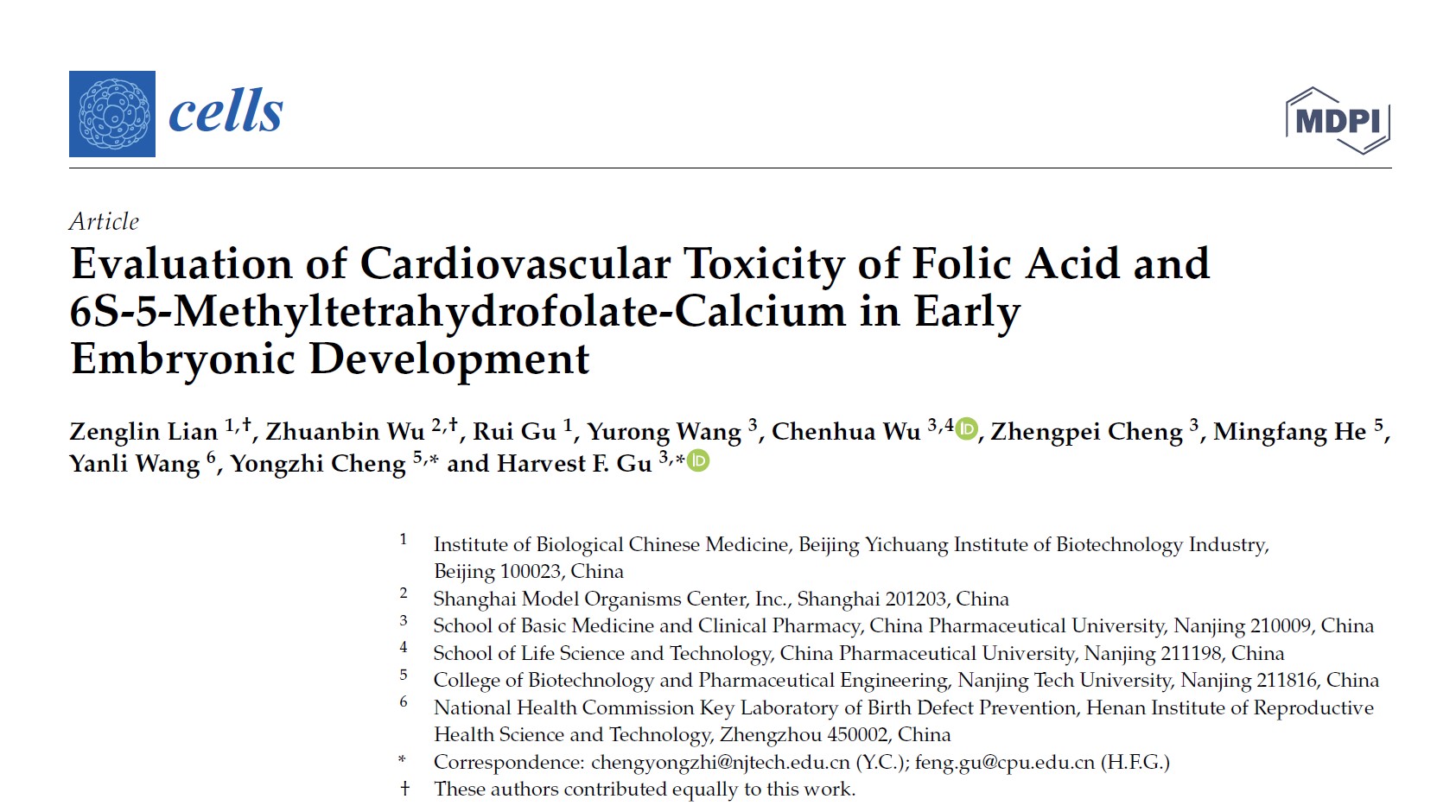
Research Background
Folic acid (FA), a synthetic form of vitamin B9, is widely used to prevent neural tube defects in fetuses. However, emerging research suggests that excessive supplementation with folic acid may have adverse effects on the cardiovascular system of the embryo, potentially increasing the risk of congenital heart disease (CHD). To better understand this phenomenon, researchers have turned their focus to another form of folate—Magnafolate (MTHF-Ca), assessing its safety profile.
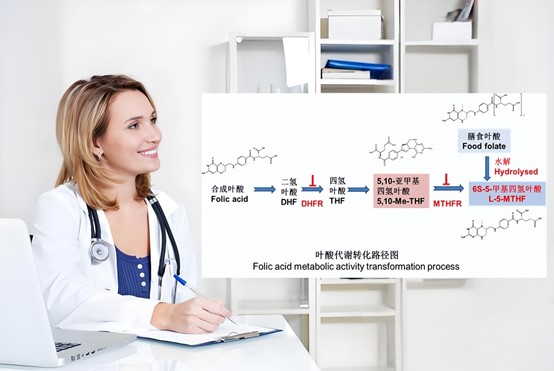
Research Methods
This study employed zebrafish models and in vitro cultured mouse blastocysts to simulate early embryonic development, evaluating the cardiovascular toxicity of folic acid (FA) and Magnafolate (MTHF-Ca).
Multiple experimental groups were designed, including different concentrations of FA and MTHF-Ca treatments, as well as control groups. The experiments were conducted from 4 hours post-fertilization to 72 hours.
By observing the cardiovascular development of the embryos and combining gene expression analysis with gene knockdown techniques, researchers aimed to uncover the mechanisms by which these two folate supplements affect the cardiovascular system of the embryo.
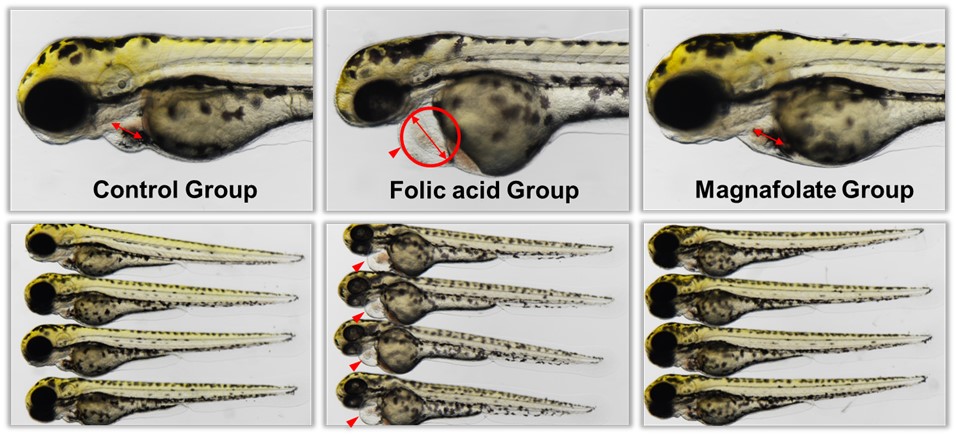
Research Findings
Cardiovascular Toxicity of Folic Acid
The study revealed that folic acid (FA) exhibited significant cardiovascular toxicity at high concentrations (250 µM to 10 mM) in zebrafish embryos. Specifically, this manifested as pericardial edema, decreased heart rate, abnormal vascular development, and a marked increase in embryo mortality.
For instance, at a concentration of 250 µM, the pericardial edema rate in zebrafish embryos increased by 2.3 times, and the heart rate dropped by 15%. At a concentration of 10 mM, the rate of abnormal vascular development reached 67%, and the mortality rate soared to 41%.
These results suggest that excessive folic acid supplementation may disrupt the normal cardiovascular development process of the embryo, thereby increasing the risk of congenital heart disease.
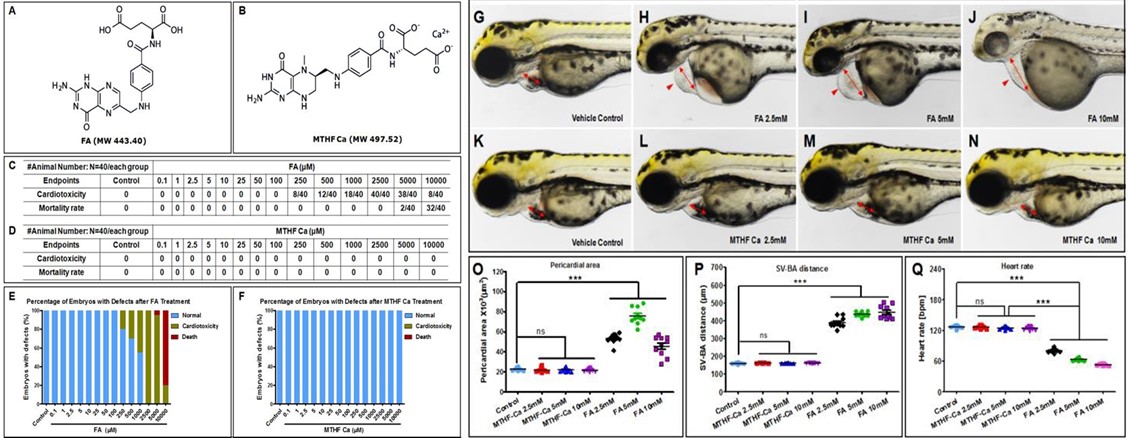
Safety of Magnafolate
In contrast to folic acid, Magnafolate (MTHF-Ca) did not show similar cardiovascular toxicity at the same concentrations. In the experiments, the cardiovascular indicators of embryos in the MTHF-Ca group (such as pericardial edema rate, heart rate, and vascular morphology) were not significantly different from those in the control group, and there was no significant increase in embryo mortality.
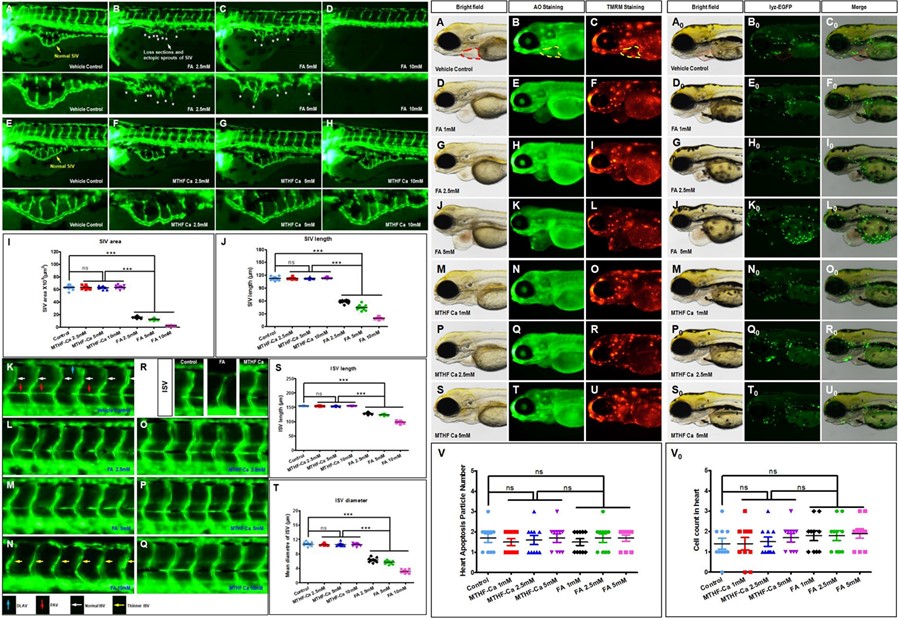
Gene Expression Analysis Reveals Potential
Mechanisms
Through gene expression analysis, researchers discovered that synthetic folic acid (FA) significantly downregulated the key gene eif1axb/Eif1ad7 in zebrafish and mice. This gene encodes a eukaryotic translation initiation factor (a critical factor in regulating protein translation), which is essential for the normal development of the cardiovascular system in embryos. The inhibitory effect of folic acid (FA) can lead to cardiovascular defects, such as pericardial edema, decreased heart rate, and abnormal vascular development.
In contrast, Magnafolate (MTHF-Ca) did not significantly affect the expression of this gene under the same experimental conditions, nor did it exhibit similar cardiovascular toxicity. This indicates that Magnafolate (MTHF-Ca) has a significant safety advantage during embryonic cardiovascular development. It does not interfere with the expression of key genes and the normal development of the cardiovascular system, as synthetic folic acid (FA) does, thus providing a more reliable safeguard for the healthy development of the embryo.
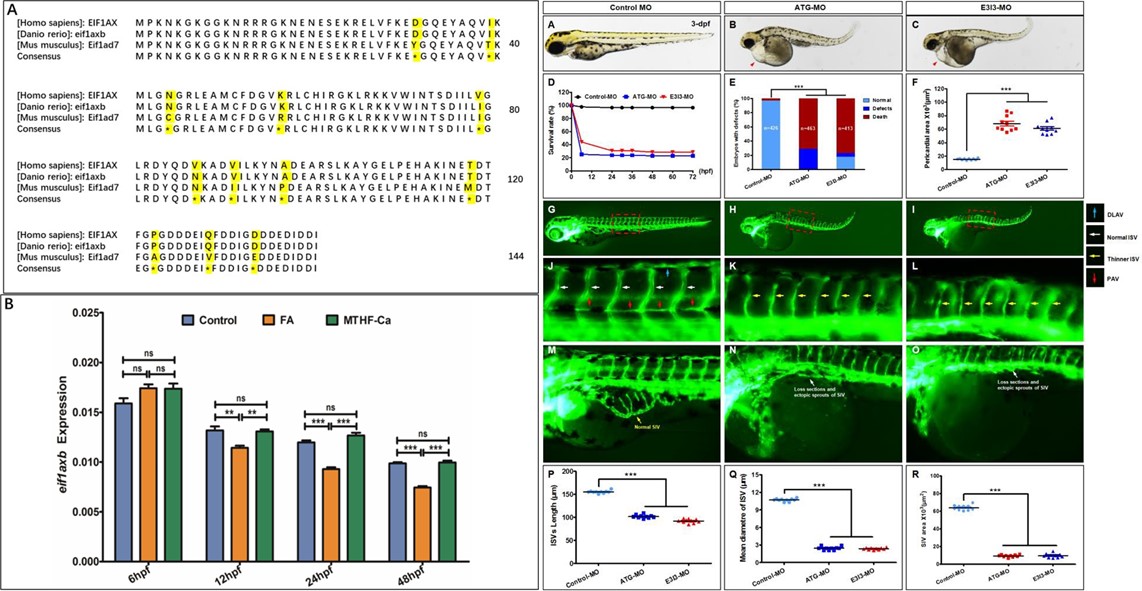
Scientific Advice for Expectant Mothers and Conclusion: Balanced Supplementation for a Healthy Start
Folate supplementation during pregnancy is an essential measure to ensure the healthy development of the fetus, but a scientifically rational approach to supplementation is equally important. Excessive folic acid supplementation may pose potential risks, while Magnafolate (MTHF-Ca) offers a safer alternative for folate supplementation.
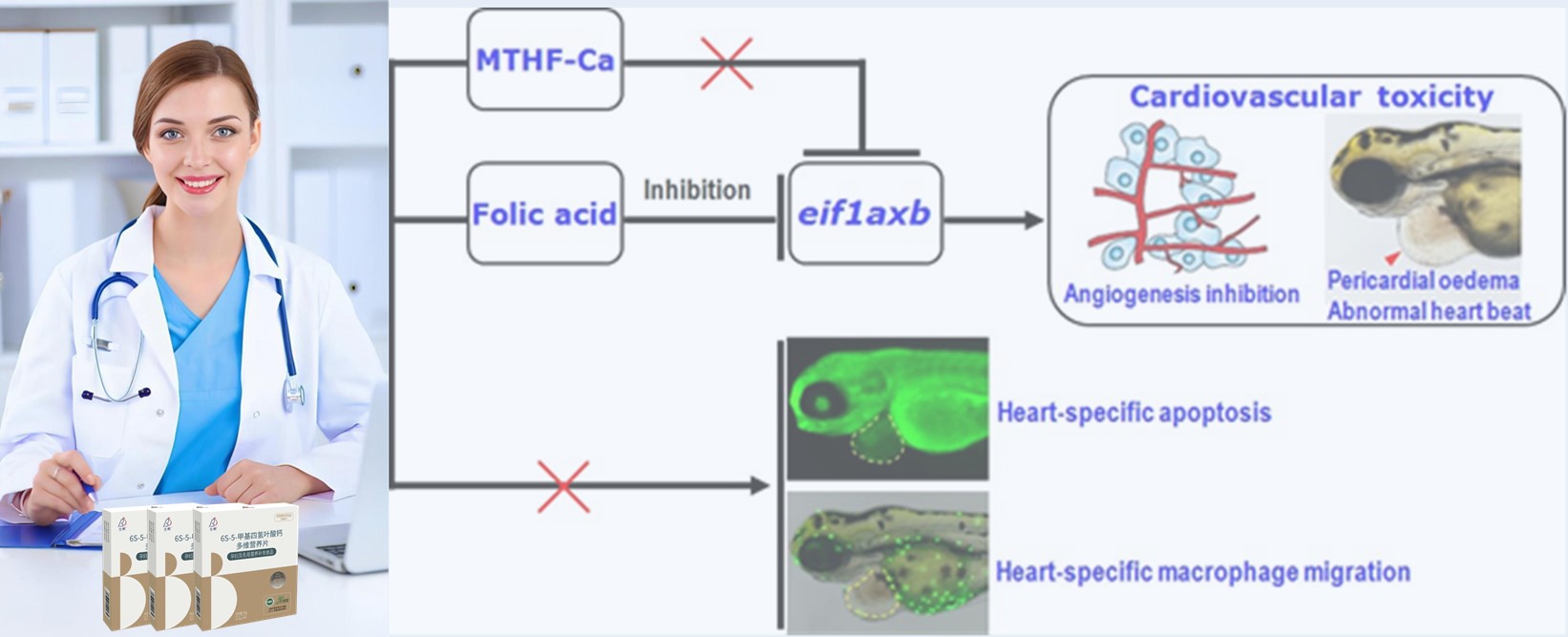
Pregnant women should balance "adequate intake" with "safety" when supplementing with folate. This study demonstrates that Magnafolate (MTHF-Ca) has significant safety advantages in experiments. Therefore, expectant mothers should consider their metabolic status and follow medical advice to prioritize Magnafolate (MTHF-Ca), which can be directly absorbed and rapidly increase serum and red blood cell folate levels. This can effectively avoid the potential risks associated with excessive synthetic folic acid (FA), ensuring the healthy development of the baby and making pregnancy nutrition supplementation more scientific and safe.

We hope that every expectant mother can follow scientific guidance to supplement folate rationally, safeguarding the healthy development of their baby and welcoming a healthy and happy new life!
References
Lian Z, Wu Z, Gu R, Wang Y, Wu C, Cheng Z, He M, Wang Y, Cheng Y, Gu HF. Evaluation of Cardiovascular Toxicity of Folic Acid and 6S-5-Methyltetrahydrofolate-Calcium in Early Embryonic Development. Cells. 2022;11:3946.

 Español
Español Português
Português  русский
русский  Français
Français  日本語
日本語  Deutsch
Deutsch  tiếng Việt
tiếng Việt  Italiano
Italiano  Nederlands
Nederlands  ภาษาไทย
ภาษาไทย  Polski
Polski  한국어
한국어  Svenska
Svenska  magyar
magyar  Malay
Malay  বাংলা ভাষার
বাংলা ভাষার  Dansk
Dansk  Suomi
Suomi  हिन्दी
हिन्दी  Pilipino
Pilipino  Türkçe
Türkçe  Gaeilge
Gaeilge  العربية
العربية  Indonesia
Indonesia  Norsk
Norsk  تمل
تمل  český
český  ελληνικά
ελληνικά  український
український  Javanese
Javanese  فارسی
فارسی  தமிழ்
தமிழ்  తెలుగు
తెలుగు  नेपाली
नेपाली  Burmese
Burmese  български
български  ລາວ
ລາວ  Latine
Latine  Қазақша
Қазақша  Euskal
Euskal  Azərbaycan
Azərbaycan  Slovenský jazyk
Slovenský jazyk  Македонски
Македонски  Lietuvos
Lietuvos  Eesti Keel
Eesti Keel  Română
Română  Slovenski
Slovenski  मराठी
मराठी  Srpski језик
Srpski језик 








 Online Service
Online Service